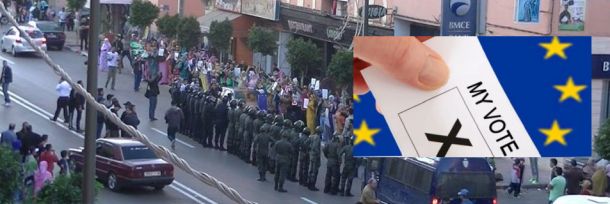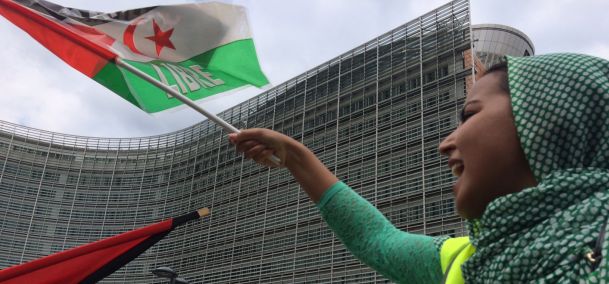The EU-Moroccan agreement that was annulled by the Court of Justice of the EU yesterday was highly controversial even at the time when it was approved in 2012. Here is the story behind that approval.
16 February 2012, the now-banned trade agreement was approved by the European Parliament. That did not happen without fierce debate.
This was a special time in the EU-Moroccan relations. The EU institutions were fully aware of the controversies of EU dealings in Western Sahara. Just few weeks before, the European Parliament had rejected the renewal of a Morocco-EU fisheries agreement covering the waters offshore the occupied territory, and matters of international law were one of the key concerns among the Members of Parliament.
The debate over Western Sahara was so intense in the EU institutions, that the former fisheries commissioner Maria Damanaki suggested excluding Western Sahara from the application of a new fisheries agreement that was about to be negotiated.
So how did that vote go through in such a context?
The arguments circulating during the parliament debate has been outlined in an article by WSRW board member Erik Hagen earlier this year, in the article 'Fish Before Peace – the EU in Western Sahara', appearing in the French anthology Lutter au Sahara (2015). The whole article (which has the fisheries agreement as its main focus) can be read here. The below segment is a small part of that bigger article. The Legal Opinion of the Parliament Legal Services, from 2011, is also worth a read.
Tomato side-effect
The Parliament’s refusal of the fisheries agreement [in December 2011], and the following tension with Rabat, had a peculiar consequence. For years the Commission and Morocco had discreetly been negotiating another bilateral agreement, regarding free trade of agriculture and fisheries products.
The deal, which was an extension of the important EU-Morocco Association agreement from 2000, had already gone through the Council, and was up for vote in the Parliament on 16 February 2012, only two months after the European Parliament had thumbed down the fish pact. The agreement meant the trade liberalisation of a wide range of agriculture and fisheries products between the Moroccan and EU markets. [1] No mention whatsoever was done to Western Sahara or to the Saharawis.
Through the agreement, the EU would risk to give trade preferences to products from Western Sahara. The problem was identical to the one of the fisheries. What right did Morocco have to strike deals on natural resources in Western Sahara without taking into account the wishes and interests of the Saharawis? Could Moroccan importers claim that a tomato is from Morocco if it in fact is from occupied Western Sahara?
The question would in principle be rather easy to answer: No European state recognizes Moroccan claims to the territory. Other non-EU countries, such as Norway, Switzerland or the US have clearly stated that trade preferences cannot be granted to goods from Western Sahara under their respective Free Trade Agreements with Morocco. In a recent case, a Norwegian importer was in fact imposed a 1.2 million Euro fine by the Norwegian government for importing goods from Western Sahara. The importer had falsely declared the goods as of Moroccan origin under Norway’s free trade agreement with Morocco, and had thus incorrectly received tariff reduction on imported goods.[2]
The EU tends, however, to go in the opposite direction: The EU has already approved the Moroccan government institution that issues origins of certificates for goods. That body has in turn offices located inside the occupied territories. Would the EU not violate its duty of non-recognition through such practice?
The vague geographical definition stirred debates. As the Parliament’s agriculture committee looked into the agreement, it asked the Commission to identify whether Western Sahara goods would be included in the agreement or not. The Commission, unable to give a clear answer, invited the Moroccan ambassador himself for a hearing with the committee behind closed doors. “Let’s start with the basics: Define your borders”, the ambassador was challenged by the parliamentarians. After some time, the angry ambassador was observed departing the meeting room, slamming the doors.
An intense lobby was carried out on part of the Commission and the pro-Moroccan parliamentarians to avoid the same thing to happen to the trade agreement as what happened to the fisheries. In fact, the Parliament’s rejection of the fisheries agreement in December 2011 was used as an argument to not vote against the new trade agreement also. Enough political damage had been caused on the relation with Rabat, was the argument. Yet, the problem was exactly the same:
The agreement was scheduled to directly benefit companies that export fish and agricultural products from Morocco. But many of these businesses operated from occupied Western Sahara. A report from Western Sahara Resource Watch identified eleven agricultural plantations in the region around the town of Dakhla, owned either by the Moroccan king personally, or by French or Moroccan agriculture companies.[3] Similarly, a range of fish processing companies in Western Sahara and South Morocco utilize fish caught or landed in Western Sahara. These two sectors together are an important part of Morocco’s strategy to cement the occupation, by employing Moroccan settlers in Western Sahara.
As the agriculture agreement was up for vote, many raised questions over why the EU left it to Morocco to determine the borders of its national territory. Two of the three Parliamentary rapporteurs appointed to examine the proposed agreement – the rapporteur of the Committee on Agriculture and Rural Development, and the one on International Trade – both recommended that Parliament withhold its consent.[4] The legal dilemmas resulting from the possible inclusion of Western Sahara in the territorial scope of the new agreement were part of their concern.[5]
On 16 February 2012, under intense pressure from the European Commission, the European Parliament consented to the new agreement; 369 MEPs voted in favour, 225 against and 31 abstained. Many parliamentarians were in fact under the impression that agri-industry doesn’t exist in Western Sahara and that the geographical definition debate, thus, was irrelevant. While there was a lot of knowledge in the Parliament over the EU-Morocco fisheries agreement, controversies of the trade deal, however, went under the radar of most parliamentarians.
And it is not strange the debate never got as heated as on the fisheries. “So far there is practically no agricultural activity in Western Sahara”, wrote the Commissioner for Neighbourhood Policy in a ‘fact sheet’ to the parliamentarians few weeks before the parliamentarians voted.[6] The fact that Morocco had plans for massive boom of the sector in the occupied territory was not mentioned. Nor that the agreement also covers fisheries products.
The European Commission welcomed the vote of the European Parliament on the agreement with Morocco.
"As I said in the Plenary debate, this is an important agreement, not only in economic terms, but also in political terms”, Commissioner for Agriculture and Rural Development Dacian Cioloș stated to the EU lawmakers.[7]
“To the extent that exports of products from Western Sahara are de facto benefitting from the trade preferences, international law regards activities related to natural resources undertaken by an administering power in a non-self-governing territory as lawful as long as they are not undertaken in disregard of the needs, interests and benefits of the people of that territory. The de facto administration of Morocco in Western Sahara is under a legal obligation to comply with these principles”, stated Catherine Ashton. [8] The fact that Morocco does not view itself as the administering power of Western Sahara, does not behave as such in the UN institutions, and that the UN does not view Morocco as such, seems not to be part of the EU’s analysis. The EU also went, as on the fish, against the UN legal opinion from 2002. "The EU recognises the Moroccan commercial rights in Western Sahara", one Moroccan newspaper interpreted Ashton’s statements.[9]
Alain Cadec, the same parliamentarian that lamented the turn-down of the fisheries activities in Western Sahara because Morocco positively had approached the Arab Spring, said the new trade deal was important since Morocco goes through a series of economic reforms.[10]
The Moroccan ambassador to the EU called it “a great relief”. "It is evidence of MEPs' confidence in the development and reform process in Morocco," he told the press.[11] His superior had told that the outcome was thanks to the work of the diplomatic service and Moroccan MPs.[12]
The EU-Moroccan relations were back on track.
The new trade agreement, in the end, entered into force on 1 October 2012. Since then, some states have raised concerns regarding the application of it. Both Sweden and the Netherlands have so far stated that goods coming from Western Sahara cannot be given preferential tariffs to the EU under the agreement.[13] The Commission again chose to look away from the Saharawi people’s rights. The EU is split yet again.
NOTES
[1] European Parliament, 13 July 2011, Opinion of the Committee on Agriculture and Rural Development
(PE 456.662v02-00) on the draft Council decision on the conclusion of an Agreement in the form of an Exchange of Letters between the European Union and the Kingdom of Morocco concerning reciprocal liberalisation measures on agricultural products, processed agricultural products, fish and fishery products, the replacement of Protocols 1, 2 and 3 and their Annexes and amendments to the Euro-Mediterranean Agreement establishing an association between the European Communities and their Member States, of the
one part, and the Kingdom of Morocco, of the other part (15975/2010 – C7-0432/2010 – 2010/0248(NLE))
http://www.europarl.europa.eu/committees/en/agri/draft-opinions.html?linkedDocument=true&ufolderComCode=AGRI&
ufolderLegId=7&ufolderId=03838&urefProcYear=&urefProcNum=&urefProcCode=#menuzone
[2] WSRW, 27.12.2010, Producer in Morocco stops purchases from Western Sahara, http://www.wsrw.org/a159x1764
[3] WSRW.org, 18.06.2012, Report: EU consumers unwittingly supporters of occupation, http://www.wsrw.org/a214x2321
[4] 12. European Parliament, 1 February 2012, A70023/2012 Recommendation on the draft Council decision on the conclusion of an Agreement in the form of an Exchange of Letters between the European Union and the Kingdom of Morocco concerning reciprocal liberalisation measures on agricultural products, processed agricultural products, fish and fishery products, the replacement of Protocols 1, 2 and 3 and their Annexes and amendments to the Euro-Mediterranean Agreement establishing an association between the European Communities and their Member States, of the one part, and the Kingdom of Morocco, of the other part (15975/2010– C7-0432/2010– 2010/0248(NLE))
[5] 12. European Parliament, 1 February 2012, A70023/2012 Recommendation on the draft Council decision on the conclusion of an Agreement in the form of an Exchange of Letters between the European Union and the Kingdom of Morocco concerning reciprocal liberalisation measures on agricultural products, processed agricultural products, fish and fishery products, the replacement of Protocols 1, 2 and 3 and their Annexes and amendments to the Euro-Mediterranean Agreement establishing an association between the European Communities and their Member States, of the one part, and the Kingdom of Morocco, of the other part (15975/2010– C7-0432/2010– 2010/0248(NLE))
[6] European Parliament, Parliamentary Question E-002451/2012 of 2 March 2012, http://www.europarl.europa.eu/sides/getDoc.do?type=WQ&reference=E-2012-002451&format=XML&language=EN
[7] Europa.eu, 17/02/2012, EU-Morocco: Agricultural agreement sign of credibility, http://europa.eu/rapid/press-release_IP-12-143_en.htm
[8] 14.06.2011, High Representative/Vice-President Ashton on behalf of the Commission, http://www.europarl.europa.eu/sides/getAllAnswers.do?reference=E-2011-002315&language=SL
[9] Yabiladi.com, 31.05.2011, http://www.yabiladi.com/articles/details/5677/l-ue-reconnait-droits-commerciaux-maroc.html
[10] Maghrebia, 21.02.2012, Morocco, EU adopt agriculture pact, http://magharebia.com/en_GB/articles/awi/features/2012/02/21/feature-04
[11] Maghrebia, 21.02.2012, Morocco, EU adopt agriculture pact, http://magharebia.com/en_GB/articles/awi/features/2012/02/21/feature-04
[12] Maghrebia, 21.02.2012, Morocco, EU adopt agriculture pact, http://magharebia.com/en_GB/articles/awi/features/2012/02/21/feature-04
[13] WSRW, 13.03.2013, Dutch government repeats: Western Sahara products are not from Morocco, www.wsrw.org/a105x2541
EU elections: how have candidates voted on occupied Western Sahara?
Are you casting your vote for the EU elections? Find here a complete overview of MEP candidates who have supported the Moroccan occupation of Western Sahara in previous controversial votes. Choose wisely.
UK High Court confirms EU Court rulings on Western Sahara
The UK Court has concluded that the UK government has acted unlawfully in granting preferential tariff treatment to products from Western Sahara through a deal with Morocco, and in granting fisheries quota's for fishing in Western Sahara under a fish deal with Morocco.
EU Court reaffirms position on Western Sahara
Polisario has a case, but it should be pursued when the time is right, Court implies.
Saharawi groups object to EU's Western Sahara trade plans
No less than 93 Saharawi groups have called on the EU institutions to respect the will of the people of Western Sahara when negotiating trade or fisheries agreements that will affect their occupied land.


